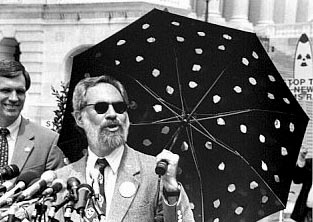|
Star Wars Umbrella/Paraguas de guerra de las estrellas by Shia photo(c)2001All rights reserved. Saturday June 16, 2001 at 08:52 AM |
| nshia@aol.com 202-824-0540 |
The Star Wars Umbrella Press conference/rally at the U.S. Capitol, Washington, D.C.

starwarsumbrella.jpg, image/jpeg, 313x222
Dr. Peter Wilk, past president of the Physicians for Social Responsibility:
" . . . a simple way to illustrate the folly of the misguided scheme; that is, the Star Wars umbrella. Would you want to go out in a rainstorm with an umbrella like this? At best this is the reality of a missile defense system, at best 95 percent effective -- and you can see how effective that would be, which means of course enough nuclear missiles would get through to destroy our country as we know it, killing millions of Americans.
|
Demonstration at the US Capitol by Shia photo(c)2001All rights reserved. Saturday June 16, 2001 at 09:10 AM |
| nshia@aol.com 202-824-0540 |
Professor Frank von Hippel, Princeton University, and Chairman of the Federation of American Scientists:
There are certain consequences to the law of physics that have to be respected by any missile defense concept. Just like various ideas of how to fly, like putting on wings and flapping your arms, it didn't work.
One of the ocnsequences to the law of physics is that light objects travel as fast in space as heavy objects. So any country that has the technology to build a nuclear arms ballistic missile could add let's say 100 illuminized ballons with inflation mechanisms, and then put the warhead inside another illuminized balloon, and that simple ploy would increase the problem of the defense by a hundred fold.
Now for more than 40 years, science advisors have advised presidents that because of such countermeasures, such possible countermeasures, a commitment to missile defense would result in a black hole in the budget. But presidents, when they are under political pressure, don't always listen to their science advisors. President Johnson ignored his science advisor when he made his decision to deploy a missile defense system. President Nixon fired his science advisor. President Reagan didn't ask his science advisor before he made his decision. And President George Bush has come up with the most elegant solution of all, which is not to have a science advisor. . .
